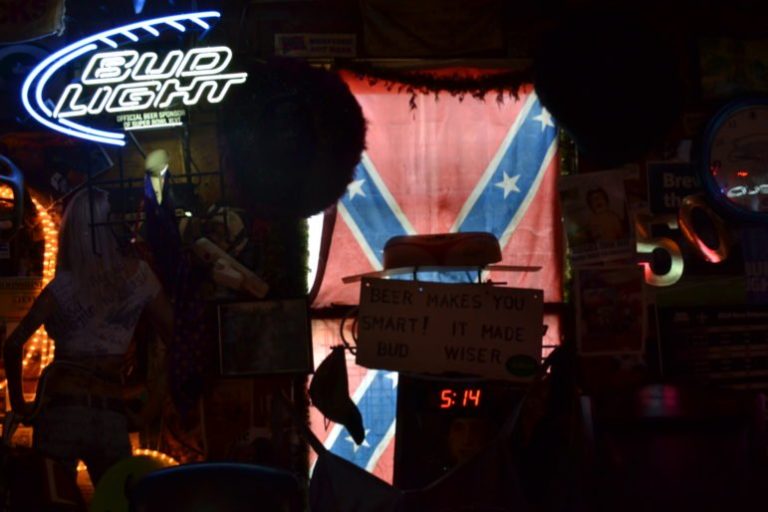
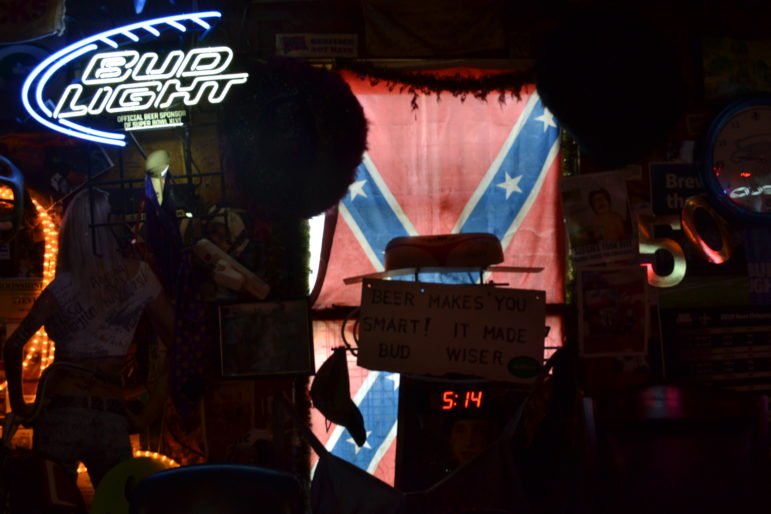
Anna Wolfe
Many Confederate battle emblems, including inside the controversial Mississippi state flag, adorn the walls of the Broke Spoke biker and sports bar, made famous by NFL legend Brett Favre in his hometown of Kiln, Mississippi. The state Senator who represents Kiln, a heavily white and conservative unincorporated community about 10 miles from the Gulf Coast, has said the flag issue should be decided by a vote of the people. A majority of his district would likely choose to keep the flag, but some in the community believe the Legislature should bring down the hurtful symbol anyway.
‘When you draw a line and you tell people to pick sides’
Within debate over the current state flag, which contains the Confederate battle emblem, rural, white Mississippi asks: “Why do I have to change?”
By Anna Wolfe | June 24, 2020
The back of Navy vet Bill Harmon’s T-shirt displayed a Rebel flag beneath the name of a biker bar, the Broke Spoke, where underwear hangs from the ceiling and beers are $2.50.
Here from his corner of Mississippi — on a hazardously tall bar stool in a small, rural, mostly white community called Kiln — Harmon said he’s watched as political pressure from outside of the state has threatened the relics of his family’s past, such as the state flag containing the “Stars and Bars.”
A photo of the drinking hole, a dingy shack with a large Confederate battle emblem serving as the sign over the front entrance, is the first thing Google culls when you search “Kiln.”
Locals drop the “n” and pronounce their unofficial town “The Kill.”
“I’m not a racist — far from. My daddy was. My grandfather was. But I’m not,” Harmon said. “But where do you say there’s no more history? At what point do you say Hitler was never there?”
Once the other regulars caught wind of the conversation from the far side of the bar, they began hurling the n-word as they discussed the uprising in several American cities following the police killing of George Floyd in Minneapolis — which has spurred the state flag debate in Mississippi once again.
Bill’s wife, Tina Harmon, also a veteran and quartermaster for the local Veterans of Foreign Wars Post 6285, said she’s not allowed to wear clothing displaying the Rebel symbol, including her own state’s flag, to work.
“It’s my state flag and I’m proud of this state,” Tina Harmon said. “And I should be able to wear it.”
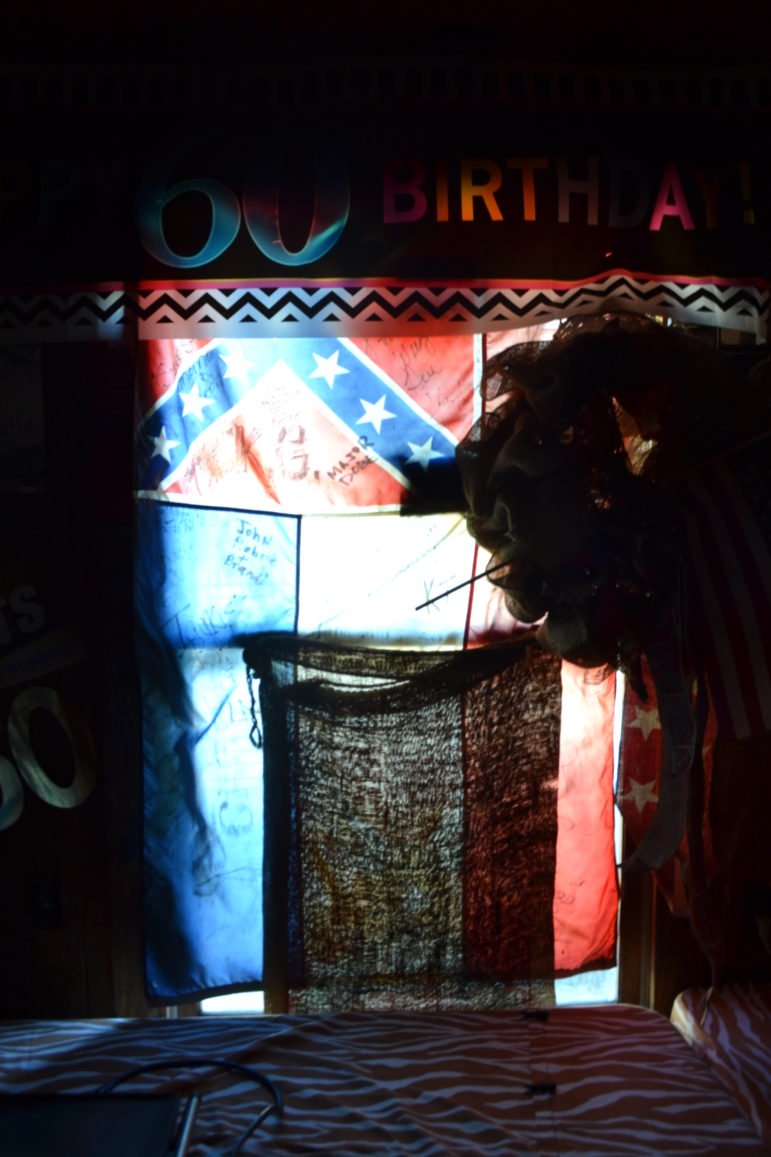
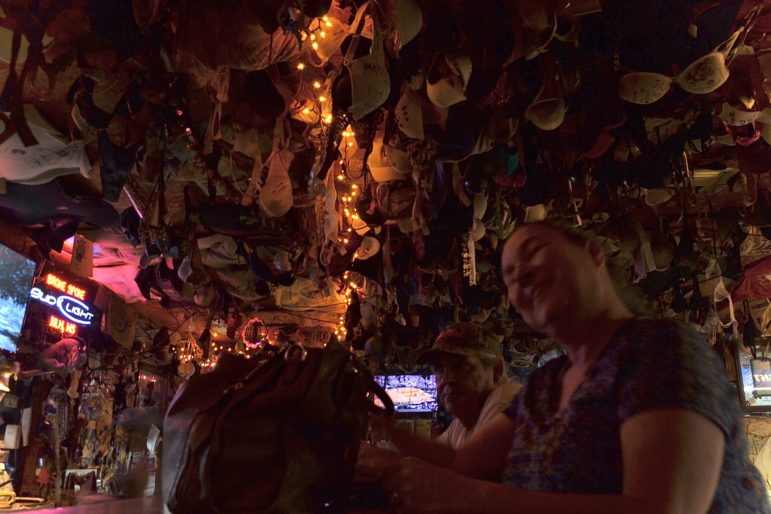
Anna Wolfe
Kiln residents and Navy veterans Tina Harmon, quartermaster for the local Veterans of Foreign Wars Post 6285, and husband Bill, regulars of the Broke Spoke, perceive the Mississippi state flag debate as akin to a sports rivalry.
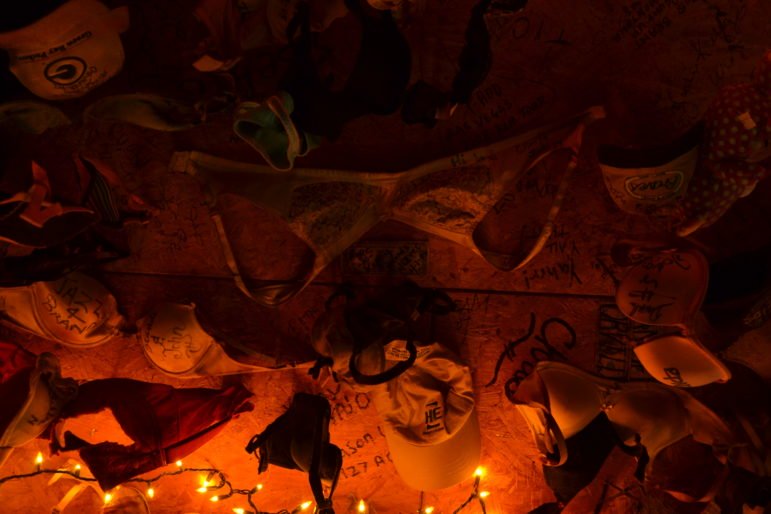
Anna Wolfe
Countless bras and underwear signed and stapled to the plywood ceiling of an old shack in Kiln, Mississippi, is an unmistakable characteristic of the Broke Spoke bar inhabiting the building. People visit from all over the country to leave their mark.
Black Lives Matter activists in Mississippi — who organized a historically large protest in Jackson on June 6, which ended with line dancing — centered adopting a new state flag among its demands for advancing racial equity.
Slavery and Jim Crow — institutions closely linked to the Confederate battle emblem — have a legacy that lives on through racial disparities that exist today: Black Mississippians are nearly three times more likely to live in poverty and to be jobless and looking for work than white. For every dollar of wealth held by white families in America, Black families have about 10 cents. In the nation’s racially segregated cities and towns, Black neighborhoods are further from grocery stores and medical facilities and more likely to be affected by pollutants, leading to poorer health outcomes.
Just days before Mississippi Today spoke with Bill Harmon, officials in two coastal towns, Gulfport and Bay St. Louis, agreed to take down the state flag from outside their city halls, as state lawmakers considered what it would take to replace the flag altogether.
A state lawmaker from Kiln, Republican Sen. Phillip Moran, told Mississippi Today the issue flag issue should be decided by a vote of the people.
Kiln is unincorporated. It has no city hall. But if it did, the mayor would be Stevie Haas, founder of the Broke Spoke, his customers say. “I don’t see what the big deal is,” Haas said, referencing the use of the Confederate battle emblem.
But when his 35-year-old dive was voted Hancock County’s Business of the Year in 2019, the local chamber produced a video promoting the award and used footage angled at the side and back of the bar, managing to avoid any shots of the Rebel flag, including the actual business sign or entrance.
Glowing newspaper profiles of the bar barely mention the iconography and the propensity for racist hate speech among some of its regulars.
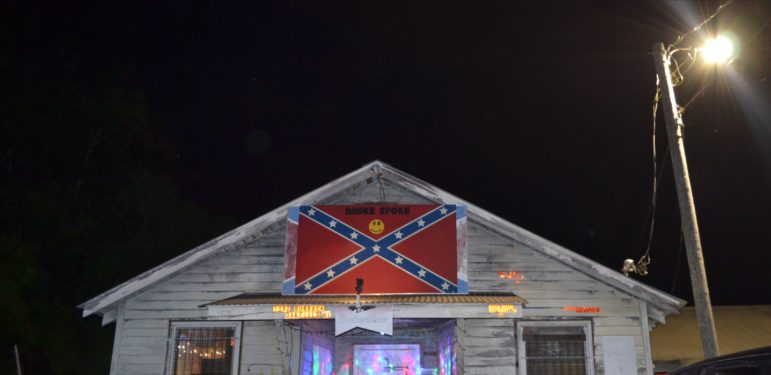
Anna Wolfe
The Broke Spoke, a 35-year-old bar in Kiln, Mississippi uses the Rebel flag as its logo, all but ensuring, deliberately or not, the establishment will not attract Black customers. The bar has, however, attracted many sports fans from out-of-state, who travel to Kiln because it is the hometown of NFL legend Brett Favre.
For Bill Harmon, people who speak out against Mississippi’s flag for glorifying the Confederacy — a never recognized republic founded on the principle that Black people are inferior to white — might as well be talking about the rival of their favorite sports team.
“I take offense to the Atlanta Falcons flag. I take offense to the Carolina flag. And LSU,” he yelled over the supportive shouts of his drinking buddies. “Should we get rid of them? Because I don’t like them.”
A few minutes after he said that, the Southeastern Conference announced it would consider preventing any championship events to be located in Mississippi because of the divisive flag, last voted on by citizens in 2001. The next day, the NCAA banned all postseason college games from taking place in the state.
Business leaders across the state have also voiced their support for lawmakers to change the flag. John Hairston, CEO of Hancock Whitney Bank and one of the most prominent business leaders in the state, recently advocated for the Legislature to change the flag without a people vote.
Legislative debate over the flag had simmered in days prior. These announcements have led lawmakers to reconsider the issue more closely as the end of the Legislative session nears Friday.
If Mississippi changes its flag, Bill Harmon said, it will be because its leaders have “bowed down” to this kind of outside political pressure. If it goes back to a vote by the people, the option preferred by many lawmakers in these very conservative districts, “then the Mississippi state flag will stay the same,” he said.
Larry, an elderly white man who has lived in Kiln for two decades and opposes the current flag, agrees. “A vote of the people? No, a vote would never happen. It would have to be a mandate,” he said.
“They are hardcore racists. They want that flag just like it is. As a matter of fact, they probably would prefer to have the confederate part of it a little bigger,” Larry said of his neighbors and the state at large, too fearful of retaliation to agree for his last name to be printed. “They’re confused. They’ve been fed a diet (of information) that is bad for them.”
A recent poll showed support the current flag statewide still outweighs support for changing it, primarily driven by the population over 65, though the gap is closing.

“A state flag shouldn’t be controversial, right? Isn’t that interesting? We should be able to hold a flag, raise a flag without being hesitant. It’s like, that should tell you right there that maybe it’s not the best option.“
Mattlan Ladner, 24, Kiln
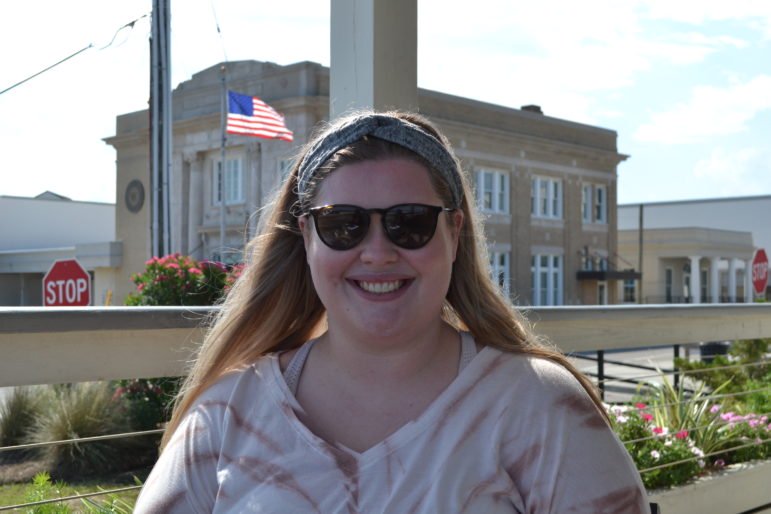
“I don’t want my students, 20 years down the road, to be having pain because of something that we as white privileged Americans could have had a say so in.”
Hannah Winchester, 22, Diamondhead
The remaining flag supporters’ grip on the Stars and Bars has tightened, and “at the core of that is that each white generation is taught by the generation in front of them that they’re better than Black people,” Larry said.
Historical documents show that the Southern states formed the Confederate States of America not just for the immediate preservation of slavery, the region’s primary economic driver, but on the foundation of white supremacy. The Rebel battle flag is the most recognizable relic of this racism, historians and educators across the state agree.
“That’s not what it means to me,” Tina Harmon said. “It’s history.”
But a whitewashing of history in America’s schools and textbooks means that many Mississippi voters today still remain ill-informed of the context surrounding the Confederacy and the Civil War.
“I remember learning we seceded. I remember learning there were issues about states rights. I was explicitly not taught that the issue was about slavery. Certainly I was never shown the secession document of Mississippi,” said Elizabeth Hegwood, a teacher and resident of a similarly conservative, though slightly more racially diverse town 20 miles southeast of Kiln called Pass Christian.
She attended Long Beach High School in the 1990s but didn’t learn that the Confederacy fought the Civil War over slavery until arriving at University of Southern Mississippi.
“Ever since I read that document, I’ve cared about (changing) the flag. And I can’t imagine that as many people as claim that it represents our heritage have read our secession document,” Hegwood said.

“Mississippi seeming like they’re completely unaware with the tenor of the rest of the country is a bad look and I think we’ve had that reputation a long time and I’m really tried of it. I think it makes us look stupid.”
Elizabeth Hegwood, 41, Pass Christian
Perhaps even more unequivocal than Mississippi’s secession declaration was the “Cornerstone Speech” Confederate Vice President Alexander Stephens gave in 1861 outlining the primary divergence of the South’s new government: “Its foundations are laid, its corner-stone rests, upon the great truth that the negro is not equal to the white man.”
In the modern era, Americans have used the Rebel battle emblem as a symbol of support for segregation and to intimidate African Americans. Mass murderer Dylann Roof often posed with the flag for photos before killing nine Black churchgoers in Charleston, South Carolina, eventually compelling the state to remove the flag from its statehouse grounds in 2015.
One younger, curly-haired man drinking at the Broke Spoke Thursday pointed to a specific Confederate battle flag, which was less worn and a much brighter red than the others, bolted to the ceiling to the right of the bar. He stuck his chest out a bit and said it was the last to fly over South Carolina, brought down to Kiln by a friend of the bar. (The Associated Press reported officials placed the flag in a Columbia museum in 2018.)
“It’s no longer a symbol of the Confederate army even,” said longtime retired columnist and Pass Christian resident Rheta Grimsley Johnson. “It’s all about what’s happened since and who’s co-opted that flag.”

Anna Wolfe
Stevie Haas, founder of the 35-year-old Broke Spoke bar in Kiln, MS, which uses the Confederate flag as it’s logo, chats with customers on June 17, 2020. He said he doesn’t view the symbol as racist. “Ever since I was a kid I had a Confederate flag T-shirt somewhere along the line. I don’t see what the big deal is.”

“I had eight grandfathers who all fought in the Civil War in Tennessee and Mississippi. They were all slave owners. So when these rednecks come up and say, ‘It’s our heritage.’ Well, I’ve got more heritage in this fight than 95 percent of the people raising the flag. But it was a flag and it was a history and a heritage of oppression and tyranny and privilege.”
Betty Sparkman, 65, Pass Christian
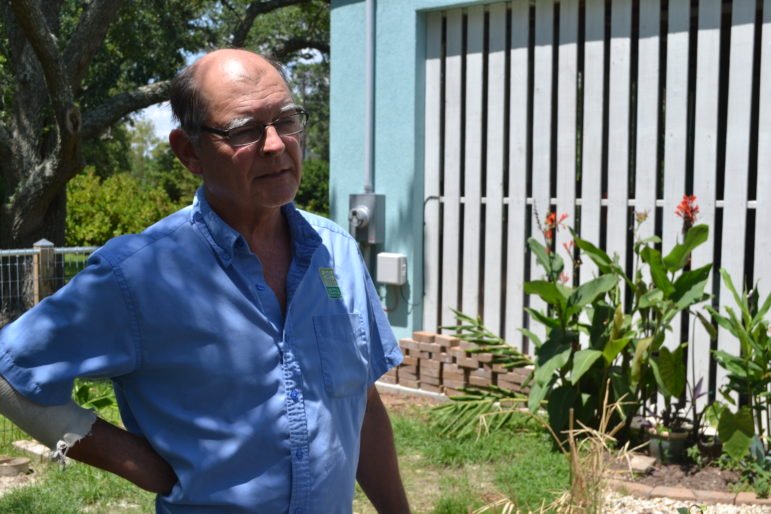
“By then (2001), I was quite convinced this whole rebel flag thing is an outrage against anyone in Mississippi who happens to be black. It’s rude. It’s a slap in the face. It’s an indictment of my grandparents. And it shows where white people were 100 years ago, when they put the flag up, which was basically saying, ‘Okay, black people, we’re in charge. Don’t forget it. If you do try to forget it, just look at this flag.’”
Shannon Williford, 63, Pass Christian
Johnson was in high school in Montgomery, Alabama, when integration occurred. She recalled when her school quit flying the Rebel flag and playing “Dixie” at football games.
“We were 15 and 16-year-olds and we had no problem with that. We got it. And that was in 1968, ’69,” she said. “So it’s always shocked me that there’s such reluctance among adults to move forward and to get rid of something that’s so obviously offensive.”
That’s the rub for flag supporters: “You take anything that offends someone … what do you got left?” Bill Harmon said.
They don’t cite concrete reasons they cling to the symbols of the Confederacy or their place in the Mississippi emblem, but their arguments for maintaining them suggest, to steal Bill Harmon’s sports analogy, they see the state flag as a point for their team.
“If you’re going to get rid of something, how about let’s get rid of Martin Luther King Boulevard?” Bill Harmon said. “How do you differentiate?”
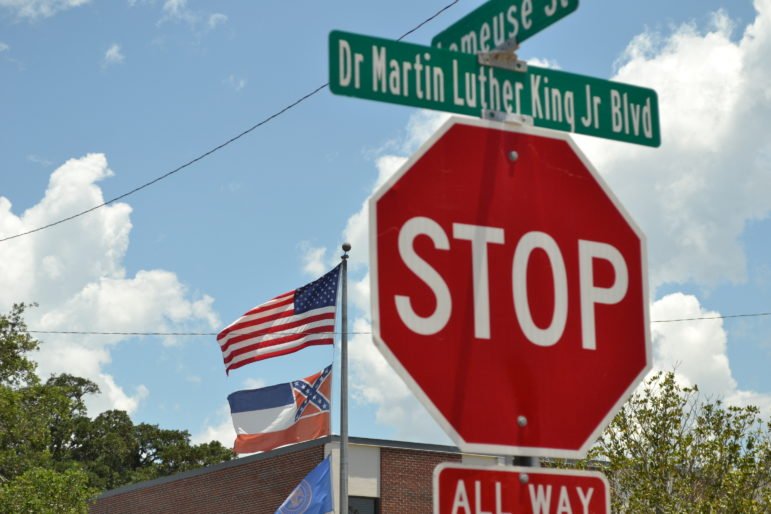
Anna Wolfe
The Harrison County Courthouse, located on Dr. Martin Luther King Jr. Boulevard, flies a Mississippi state flag containing the Confederate battle emblem. Some Mississippians who support the current flag believe the design’s nod to the Confederacy is comparable to street signs honoring the slain civil rights leader — if one comes down, they both should.
That mentality extends beyond the Rebel flag-emblazoned dive bar. Mississippi Today heard the same refrain about street signs named after the slain civil rights leader from a local politician’s wife in the Kiln diner, Cruise-In Café, earlier in the day.
“If you’re going to be discriminative against one, then it all should be taken care of,” she said without giving her name. “Then there shouldn’t be any, period.”
Many Mississippians also conflate a push to remove the Stars and Bars from the state flag with a mandate that everyone stops displaying the symbol on their private property — a notion that no lawmaker or state official has ever posed.
“If I wear something like that, it’s not because I think of it like some kind of racism or anything like that,” Tina Harmon said. “It means different things to different people. It may not mean that to me. I’m free to be who I am. Why do I have to change?”
Pass Christian High School teacher Rickey Lewis told Mississippi Today that regardless of his personal feelings about the flag, there’s something missing in that argument: Empathy for others.
“I’m not going to impose on you something that I feel hurts you,” Lewis said.
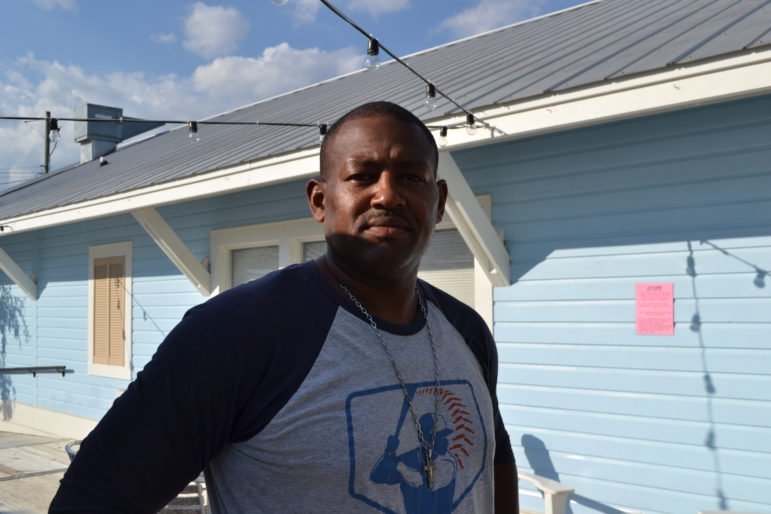
“The flag offends such a large population of people here in this state that from an empathetic standpoint, everyone should want it to come down.”
Rickey Lewis, 43, Pass Christian
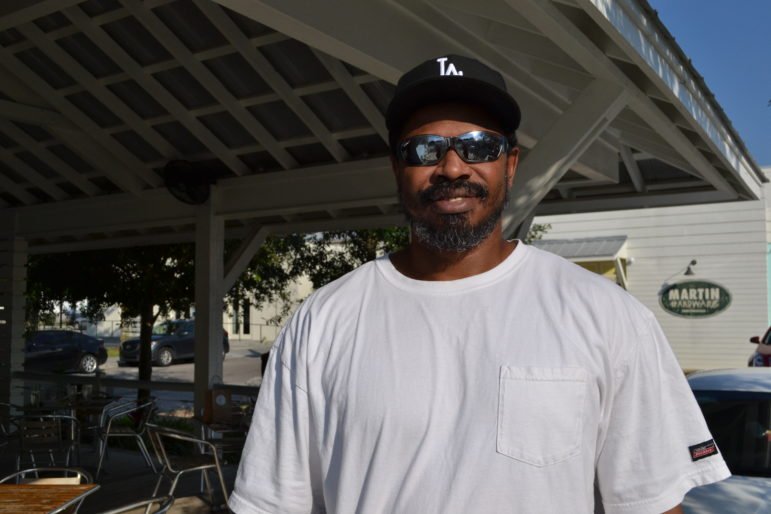
“I do think it (the Confederate emblem) is used as a symbol of hate. When you remove a lot of these racist symbols, things get better — not overnight, but things will improve.”
Willie James, 43, Pass Christian
But as an educator, he’s witnessed the way young people come into their beliefs, often with misinformation passed down to them, in this especially polarizing moment. He said he can even empathize with their passion over the state flag.
“Because many of those people are not,” Lewis said before pausing and letting out a winced breath, “are not racist.”
“But sometimes when you draw a line and you tell people to pick sides, they’re going to pick a side. And when they pick a side, they’re going to fight. And no matter what information you give them — truth or not — they’re going to fight.”
The post ‘Picking sides’: How a conservative Gulf Coast community grapples with the Mississippi state flag debate appeared first on Mississippi Today.
- State Supreme Court considers reviving former Gov. Phil Bryant’s lawsuit against Mississippi Today over welfare scandal coverage - February 18, 2026
- Winter storm update: Mississippi still waiting on fed declaration for individual assistance, lawmakers crafting plan to fund recovery - February 18, 2026
- Shy of special session, Mississippi school choice appears dead - February 18, 2026